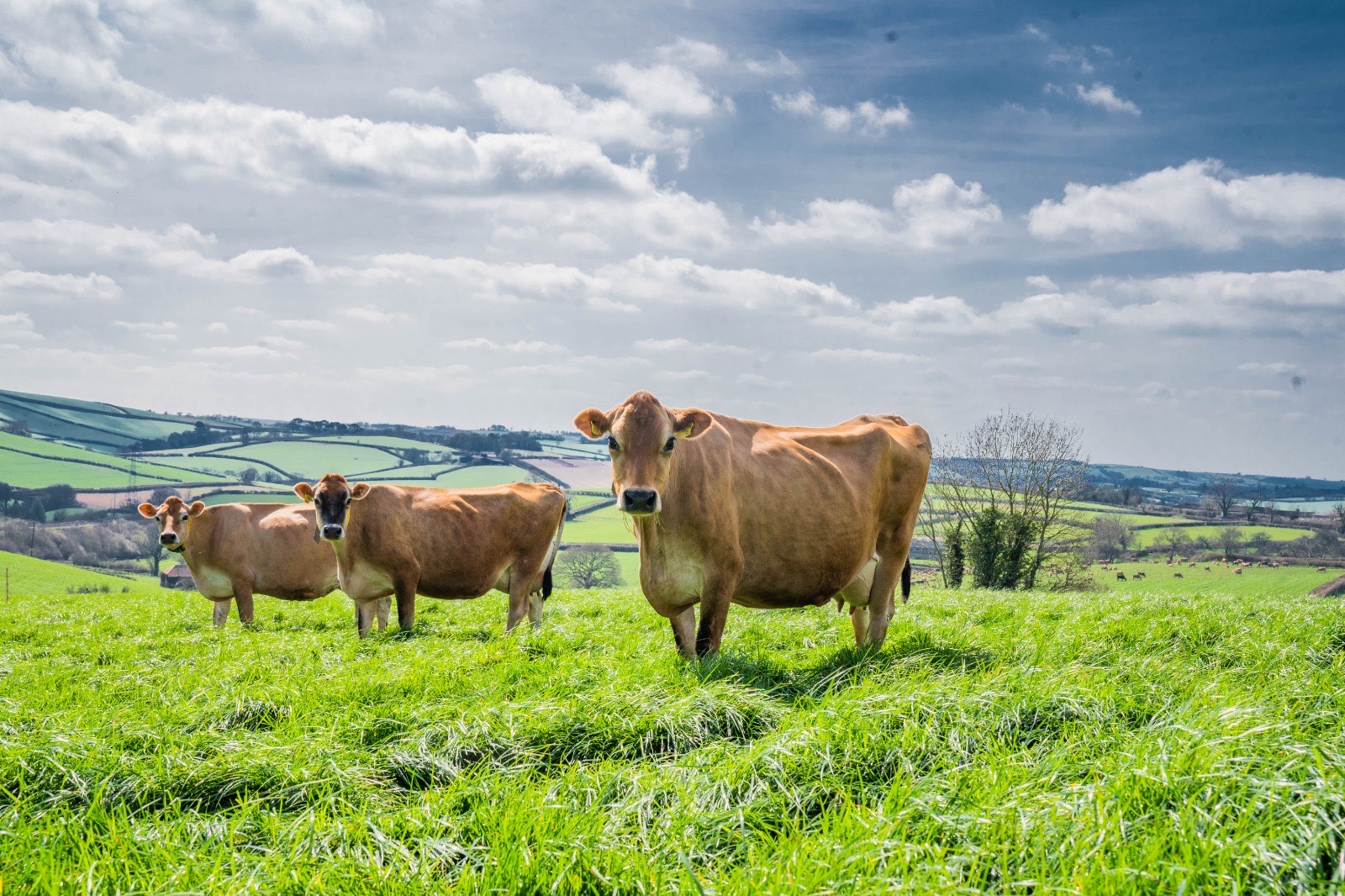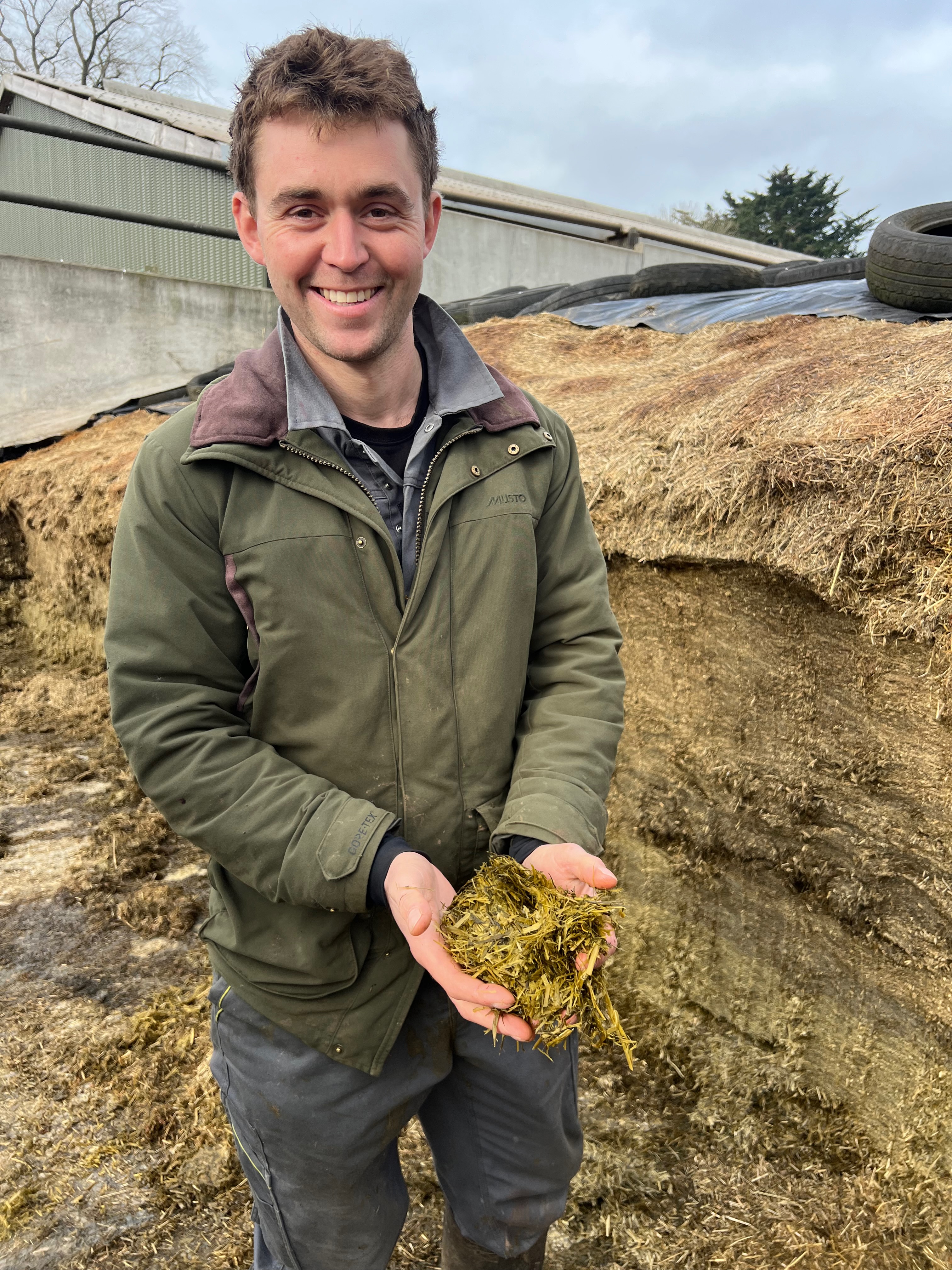Move into dairy sets farm up for sustainable future
A significant change in direction at Crokers Grange Farm has seen young farmer Niall Tewson develop a brand new dairy business, milking high health status Jersey cows, selling direct to consumers.
 Crokers Grange Farm just outside Newton Abbott in south Devon, used to be a prime beef and sheep farm with 60 suckler cows and calves and 3,000 breeding sheep.
Crokers Grange Farm just outside Newton Abbott in south Devon, used to be a prime beef and sheep farm with 60 suckler cows and calves and 3,000 breeding sheep.
But after working for six months on New Zealand dairy farms in 2019 when he was 23, Niall came home inspired and passionately keen to milk cows. And with the support of his family, that is what happened.
The beef herd and half the sheep were sold, releasing capital to install 260 cubicles in the sheds, putting in a 24/48 GEA swing-over parlour and to buy the first cows.
Seventy-three days after lambing 1500 ewes in the spring of 2021, the first of 130 pedigree Jersey heifers imported from Denmark were being milked. These were followed by 100 more heifers bought from local high health herds.
“We work with Douglas Green Consulting and at the start planned three scenarios: one for an outdoor grazing unit with cross-bred cows, one having fewer but higher yielding Holsteins on an indoor system and finally having Jerseys.
“In the end the reason we went with Jerseys is because I could only get a Channel Island contract from Gordon Davis of Rivermead Dairies. I shall always be grateful to Gordon for supporting me then, and he still mentors me now.”
The Tewson’s had initially rented the 122ha farm from 1993 but bought it seven years ago. The cows can access 50ha to graze, with the rest of the land the other side of a very busy road, managed to produce winter forage.
“The land at the top of the farm is free draining shillet and we can get the cows out very early” Niall explains. “The lower end of the farm is heavier red Devon clay and can get sticky. But it is a true grass farm, that is what grows best here.”
Grassland
-and-William-Pitts.jpeg) Niall and his father before him, have worked with Cullompton agronomist William Pitts of NB Pitts for many years, buying grass and maize seed and fertiliser from him. William is the fifth generation to run the agricultural merchanting business and has been working closely with Oliver Seeds regional manager John Harris since 2016. He values the technical input and support John has given him over the years.
Niall and his father before him, have worked with Cullompton agronomist William Pitts of NB Pitts for many years, buying grass and maize seed and fertiliser from him. William is the fifth generation to run the agricultural merchanting business and has been working closely with Oliver Seeds regional manager John Harris since 2016. He values the technical input and support John has given him over the years.
“In 2019, on William’s advice we reseeded a lot of the grassland with Oliver Seeds mixture MegaBite, ready for the new dairy,” says Niall. “This predominantly late perennial ryegrass sward, including new varieties Nashota, Thegn and Bowie, produces high yields of high quality feed, but also keeps going if we get a drought, which we often do in summer.
 “The fields were reseeded early last autumn using a plough and power harrow with MegaBite, but this time with added clovers, plantain and other herbs, so that all the fields now qualify for the Sustainable Farming Incentive (SFI).
“The fields were reseeded early last autumn using a plough and power harrow with MegaBite, but this time with added clovers, plantain and other herbs, so that all the fields now qualify for the Sustainable Farming Incentive (SFI).
“The swards are now richer, greener and fuller and will be powering the production of milk from 21-day rotations from early February to mid-October. Its ability to regrow quickly when managed correctly is phenomenal. And being dual purpose, we can cut anything we do not graze.
With crop nutrition advice from William, Niall applies 75kgN/ha using a urea 40N:14So3 onto the grassland from mid-February ready for the expected early grass growth. A total of 150kgN/ha is applied as fertiliser over the growing season applied after each grazing.
Cow performance
Having reached a high of milking 240 cows, the bottom 20% were culled in the summer of 2023. In December 2024, the herd produced more milk than the previous December, but with less milking cows. Niall puts this down to better management, better cows and better forage.
The average annual milk yield is 6,200 litres at 4.3% protein and 5.8% butterfat, with 1,613 litres coming from forage. The cows are fed 0.38kg of concentrate/blend per litre of milk produced. Niall is hoping to achieve up to 7,500 litres a cow a year whilst also maintaining profitability.
A total mixed ration (TMR) of 50:50 maize and grass silage is topped up with concentrates to yield in the parlour. Contractors come in and make the silage and there is a full time herdsman and one other worker.
“We were block-calving in spring but are now going to all year round to even out supply and workload including looking after calves and cash flow,” Niall adds. “We are also starting to crossbreed with Irish Holsteins to get more milk with the same milk solids.
Direct selling
In May 2023 Niall bought a vending machine and sited it at the top of the farm drive. Budgeted to sell 50 litres of pasteurised unhomogenised milk a day, they were soon selling 200 litres a day through one machine.
“We had branded ourselves as South Devon Dairy and were already active on social media telling people what was happening on the farm, so it soon took off,” says Niall.
“I started with a batch pasteuriser which took eight hours to process from raw to processed down to 3 degrees centigrade. Now I have an inline pasteuriser which is much quicker.
“At weekends we are now selling 400 litres of milk/milkshake a day through two vending and one coffee machine, which means we are earning an average of £1.87/ litre. I really feel the future for our business in selling direct to the consumer.
“Managing customers can be tricky, but we are doing all we can to keep them happy, with ample off-road parking, a play park and small animal petting area. We sell several flavours of milk shake and handmade gelato, my mother bakes cakes and biscuits and we also sell locally produced meat and vegetables.
“Education is also a large part of wat we do here. I feel it is very important to teach the younger generation on where and how their food is produced. We invite schools and other groups to sow them all we can.
“But I must make sure I do not take my eye off the cows, as without them I would have nothing to sell. There has to be a balance between the two.”
